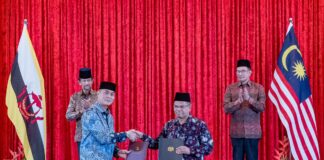PUTRAJAYA, March 5 — The Education Ministry (MOE) will focus on an approach which optimises students’ potential, starting from primary school, in efforts to produce a generation that is confident in its own strengths.
Senior Education Minister Datuk Dr Radzi Jidin said that the focus of the MOE now was to unearth the potential of students based on their strengths and advantages, to develop their talents.
“This (unearthing the potential of students) is one of the best spaces for us (to develop students’ talents) especially at the primary school level. We look at where their strengths lie and what their strengths are so that we can develop them and they can also optimise the strengths that they have,” he said in an interview on ‘Malaysia Prihatin’ Achievements of MOE recently.
Radzi also stressed that the labelling of ‘kelas belakang’ (underperforming) students in schools should not happen, especially at the primary school level.
He said it was too early to label primary school students in certain categories as they were just developing their potential at that age.
“Personally, I believe that each human being is created with their own strengths and each of the children has their unique strengths, only we are aware of it or not… maybe in the field of education they stand out less.
“We do not know where their potential may lie. That is why I always advise that there should be no labelling of ‘kelas depan’ (performing) or ‘kelas belakang’ (underperforming) students because this will have a psychological effect on our children,” he said.
In another development, the minister said that there was increased response to Technical and Vocational Education and Training (TVET) among students who wanted to get space and opportunities in programmes offered in the field.
He said that the ministry’s intention was to ensure that TVET students received an education in line with current industry developments.
“We do not want to teach TVET using old technology … when the students complete their studies, the industry uses much advanced technology. One of our emphases is to increase cooperation between vocational colleges and industry to ensure that whatever we teach provides space and opportunities for them to work in industry where the technology used is the same technology they learn in school,” he said.
In the interview, Radzi also commented on the challenges faced by the MOE in 2020 when the country faced the COVID-19 pandemic, requiring the ministry to make some decisions beyond expectations and norms.
He acknowledged that the biggest challenge in the early stages was how to ensure that teaching and learning (PdP) could continue in a pandemic environment that saw the country being placed under the Movement Control Order (MCO).
He said that the decisions taken by the government, including implementing the MCO from March 18, 2020, were based on its own strategy and methods as at that time; nobody in the world had experience in managing the COVID-19 pandemic.
“When the COVID-19 pandemic occurred, none of us had ever had such an experience; no one had ever dealt with a crisis of that size involving the education sector,” he said.
Similarly, at the ministry level, Radzi said his ministry decided to continue with the home-based teaching and learning (PdPR) method following the closure of schools as a result of the implementation of MCO, despite realising that there were constraints in terms of devices and internet access.
“‘Alhamdulillah’ (praise be to Allah) we managed to continue the PdPR method. It was different from face-to-face sessions at school but at least at that time we tried our best based on the constraints to find space so that children continue to have ‘attachment’ with school. We do not want children to lose touch with school. That was the biggest challenge at the early stage,” he recalled.
He said that his ministry also provided flexibility for teachers to choose whichever approach was appropriate for the students, who were from various socio-economic backgrounds.
Apart from that, he said that his ministry also created a special terrestrial Education TV channel, DidikTV KPM, to help students who do not have internet access or suitable devices.
Touching on the reopening of schools, Radzi said that the decision to reopen schools when the country was still facing a pandemic was made not just by simply pressing the ‘open’ button, instead it went through a long discussion process, by taking into account all views presented.
Despite receiving mixed reactions and sentiments, especially from parents and teachers, he said that all parties need not worry, because as long as the standard operating procedure (SOP) is complied with, the risk of COVID-19 transmission in schools can be reduced.
“The decision taken at the ministry level is not the decision of the minister. Many factors were taken into account and at the same time safety is one of the most important components. In the context of school reopening, we are open … but what we need to do, what is the best approach?
“We cannot satisfy everyone. I am here to make the decisions we believe are the best, based on the information, data and analysis that we have,” he said.
Sharing long-term plans, Radzi said that the ministry would focus on the implementation of the Digital Education Policy in ensuring students would not be left behind in the context of global competition.
He said that many countries are now seen to have started their education digitalisation plans early due to the current situation, which requires a fast-moving education system.
“We cannot be allowed to be left far behind. How do we want to maximise the available technology to ensure that this PdP can be implemented well. As for the focuses, one of the areas that we will emphasise is related to digital education. This is the way forward,” he said.
He said that the ministry also provided training and courses for teachers so that they would also be prepared to face changes in the education system in the future.
















